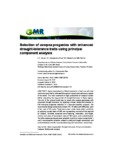Please use this identifier to cite or link to this item:
http://www.alice.cnptia.embrapa.br/alice/handle/doc/1048473| Title: | Selection of cowpea progenies with enhanced drought-tolerance traits using principal component analysis. |
| Authors: | SOUSA, C. C.  SILVA, K. J. D. e   BASTOS, E. A.   ROCHA, M. de M.   |
| Affiliation: | C. C. SOUSA, UFMA; KAESEL JACKSON DAMASCENO E SILVA, CPAMN; EDSON ALVES BASTOS, CPAMN; MAURISRAEL DE MOURA ROCHA, CPAMN. |
| Date Issued: | 2015 |
| Citation: | Genetics and Molecular Research, v. 14, n. 4, p. 15981-15987, 2015. |
| Description: | Vigna unguiculata (L.) Walp (cowpea) is a food crop with high nutritional value that is cultivated throughout tropical and subtropical regions of the world. The main constraint on high productivity of cowpea is water deficit, caused by the long periods of drought that occur in these regions. The aim of the present study was to select elite cowpea genotypes with enhanced drought tolerance, by applying principal component analysis to 219 first-cycle progenies obtained in a recurrent selection program. The experimental design comprised a simple 15 x 15 lattice with 450 plots, each of two rows of 10 plants. Plants were grown under water-deficit conditions by applying a water depth of 205 mm representing one-half of that required by cowpea. Variables assessed were flowering, maturation, pod length, number and mass of beans/pod, mass of 100 beans, and productivity/plot. Ten elite cowpea genotypes were selected, in which principal components 1 and 2 encompassed variables related to yield (pod length, beans/pod, and productivity/plot) and life precocity (flowering and maturation), respectively. |
| Thesagro: | Seleção Recorrente Vigna Unguiculata |
| Keywords: | Tolerância à seca Caupi Análise multivariada |
| Type of Material: | Artigo de periódico |
| Access: | openAccess |
| Appears in Collections: | Artigo em periódico indexado (CPAMN)  |
Files in This Item:
| File | Description | Size | Format | |
|---|---|---|---|---|
| Gmr6342.pdf | 271.91 kB | Adobe PDF |  View/Open |









